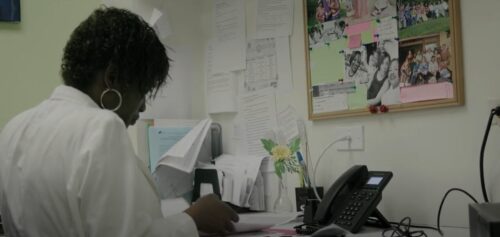
Una doctora en una de las clínicas de Profamilia, donde se implementa una estrategia de detección de violencia de género con todas sus usuarias.
(Una doctora en una de las clínicas de Profamilia, donde se implementa una estrategia de detección de violencia de género con todas sus usuarias.)News
A different future for gender-based violence survivors in the Dominican Republic
When Maria* first got married, she dreamed of building a family in a peaceful home. She had witnessed domestic violence as a child, watching her mother struggle with an abusive partner while raising ten children, and she wanted to break that cycle. However, after the first few years of her marriage, Maria’s former husband began to show aggressive and controlling behavior. He would humiliate her and confiscate the money she brought home to provide for their three children.
Over time, Maria* found the strength to end her relationship. “I didn’t want my children to think that domestic violence is normal. I had to be their example”, she says. She had been separated from her aggressor for a few years when the Covid-19 pandemic hit, and her ex-husband coerced her and their children to move back home. The aggressive behavior began again; Maria’s former husband confiscated her phone to track her communications, and he became physically violent towards her. As her ex isolated Maria from the outside world, Maria feared for her life.
At her first appointment in one of Profamilia’s clinics, Maria* was not planning to talk about what she was going through, but they asked. Since 2006, Fòs Feminista’s Dominican partner Profamilia has implemented a gender-based violence screening strategy with their users. All women who attend a medical or psychological consultation, for whatever reason, are asked about experiences that may indicate situations of violence. If Profamilia staff recognize signs of abuse in users, they refer them to clinical, psychological, legal and social services, all offered by the organization.
That is how Maria* met Senaya Hernandez, a legal advisor at Profamilia. “When Senaya approached me, I began to feel that a helping hand was going to protect me, that someone could listen to me and find out what was going on. I began to tell her about the violence I had endured for 12 years,” says Maria.
Senaya provided Maria with support and the legal knowledge she needed to pursue her case under a court of law. Maria’s journey to protect herself and her children and to hold her perpetrator accountable hasn’t been easy. She has faced institutional violence after pressing charges, when her own lawyer failed to adequately represent her in court. Once again, Profamilia supported her in finding a path forward.
A bit of history
Founded in 1966, Profamilia has been supporting people in exercising their sexual and reproductive rights for decades. With their clinics and mobile health unit, they promote gender equity by increasing access to sexual education, contraceptive methods, prenatal care, gender-based violence support and other sexual and reproductive health services, particularly for marginalized communities in the Dominican Republic.
Through an approach that combines care, community engagement, and advocacy, Profamilia is working to break a culture of silence surrounding sexual and reproductive health in the Dominican Republic.
Profamilia’s work is of the utmost importance in a country that has one of the highest femicide rates in Latin American and the Caribbean and where one in three women experience gender-based violence in their lifetime. Along with other feminist organizations and movements, Profamilia advocates for legal changes to better prevent and respond to gender-based violence and to protect women’s bodily autonomy, like a new comprehensive law on violence against women and the end of the country’s total ban on abortion.
With Profamilia’s support, Maria* has been rebuilding her life. She now lives in a peaceful home, and her children are doing well in school. But this is not the end of her story: Maria has been sharing her experience with gender-based violence in hopes of supporting other women who may be in danger.
“I feel emotionally and psychologically empowered, because in my work I can talk with other women who need help. I share with them part of my story and I tell them to go to Profamilia, that they will find help there, like I did.”
Watch the story:
* The survivor’s name was changed to protect her privacy.